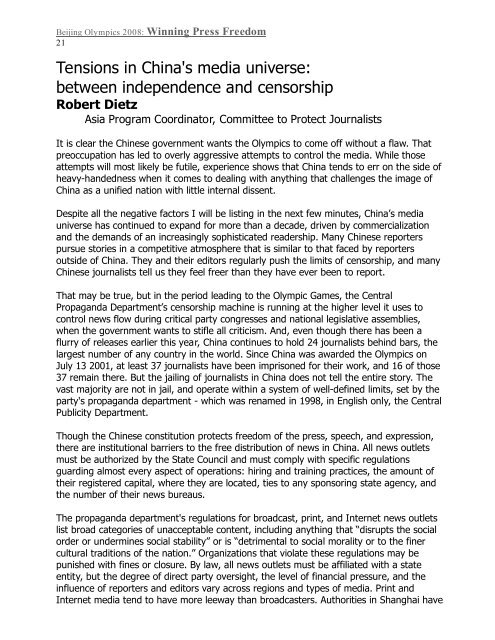Beijing Olympics 2008: Winning Press Freedom - World Press ...
Beijing Olympics 2008: Winning Press Freedom - World Press ...
Beijing Olympics 2008: Winning Press Freedom - World Press ...
Create successful ePaper yourself
Turn your PDF publications into a flip-book with our unique Google optimized e-Paper software.
<strong>Beijing</strong> <strong>Olympics</strong> <strong>2008</strong>: <strong>Winning</strong> <strong>Press</strong> <strong>Freedom</strong><br />
21<br />
Tensions in China's media universe:<br />
between independence and censorship<br />
Robert Dietz<br />
Asia Program Coordinator, Committee to Protect Journalists<br />
It is clear the Chinese government wants the <strong>Olympics</strong> to come off without a flaw. That<br />
preoccupation has led to overly aggressive attempts to control the media. While those<br />
attempts will most likely be futile, experience shows that China tends to err on the side of<br />
heavy-handedness when it comes to dealing with anything that challenges the image of<br />
China as a unified nation with little internal dissent.<br />
Despite all the negative factors I will be listing in the next few minutes, China’s media<br />
universe has continued to expand for more than a decade, driven by commercialization<br />
and the demands of an increasingly sophisticated readership. Many Chinese reporters<br />
pursue stories in a competitive atmosphere that is similar to that faced by reporters<br />
outside of China. They and their editors regularly push the limits of censorship, and many<br />
Chinese journalists tell us they feel freer than they have ever been to report.<br />
That may be true, but in the period leading to the Olympic Games, the Central<br />
Propaganda Department’s censorship machine is running at the higher level it uses to<br />
control news flow during critical party congresses and national legislative assemblies,<br />
when the government wants to stifle all criticism. And, even though there has been a<br />
flurry of releases earlier this year, China continues to hold 24 journalists behind bars, the<br />
largest number of any country in the world. Since China was awarded the <strong>Olympics</strong> on<br />
July 13 2001, at least 37 journalists have been imprisoned for their work, and 16 of those<br />
37 remain there. But the jailing of journalists in China does not tell the entire story. The<br />
vast majority are not in jail, and operate within a system of well-defined limits, set by the<br />
party's propaganda department - which was renamed in 1998, in English only, the Central<br />
Publicity Department.<br />
Though the Chinese constitution protects freedom of the press, speech, and expression,<br />
there are institutional barriers to the free distribution of news in China. All news outlets<br />
must be authorized by the State Council and must comply with specific regulations<br />
guarding almost every aspect of operations: hiring and training practices, the amount of<br />
their registered capital, where they are located, ties to any sponsoring state agency, and<br />
the number of their news bureaus.<br />
The propaganda department's regulations for broadcast, print, and Internet news outlets<br />
list broad categories of unacceptable content, including anything that “disrupts the social<br />
order or undermines social stability” or is “detrimental to social morality or to the finer<br />
cultural traditions of the nation.” Organizations that violate these regulations may be<br />
punished with fines or closure. By law, all news outlets must be affiliated with a state<br />
entity, but the degree of direct party oversight, the level of financial pressure, and the<br />
influence of reporters and editors vary across regions and types of media. Print and<br />
Internet media tend to have more leeway than broadcasters. Authorities in Shanghai have





